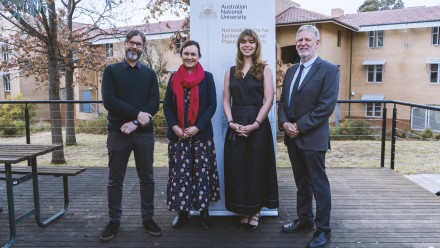Dr Jennifer Ma

Contacts
Biography
Dr. Jennifer Ma is an Early Career Researcher in suicide prevention, mental health, and wellbeing research. She received her PhD from the Centre for Mental Health Research at the Australian National University with the support of a 2015 ANU/ National Health and Medical Research Council (NHMRC) Centre for Research Excellence in Suicide Prevention (CRESP) scholarship.
Since 2019, Dr. Ma has held an honorary appointment as Adjunct Assistant Professor with the Faculty of Education at the University of Canberra. From 2020-21, she was employed at UC as a Research Fellow in the Faculty of Health (0.8FTE) and Faculty of Education (0.2FTE), serving as primary project support on an NHMRC partnership grant held with Lifeline Australia and on funded wellbeing education projects with school/ organisational partners. She is also co-director for the International Beliefs and Values Institute (IBAVI) Australian chapter at UC.
To date, Dr. Ma has been awarded over $560K in competitive funding (including Fellowships). Her research has contributed to testing of the Interpersonal Psychological Theory of Suicide (IPTS) model, the development and validation of a new measure for interpersonal suicide risk, investigating help seeking for suicidality and mental health problems, exploring consumer expectations of crisis lines (including the introduction of new technologies), and co-design research of local and international wellbeing education frameworks in schools and organisations.
Currently, Dr. Ma is a Suicide Prevention Australia Post-Doctoral Research Fellow at the Centre for Mental Health Research where her research aims to: (1) develop and expand evidence around the protective factors against suicide, with a particular focus on examining how interpersonal factors outlined by leading predictive models of suicide, such as social connectedness, can be effectively promoted in community contexts, (2) support the development of stakeholder-informed suicide prevention and intervention initiatives using participatory research methods with people with lived experience of suicide, and (3) refine suicide theory and models to better facilitate their translation in suicide prevention policy and practice.
Research
Research interests
- Suicide prevention and mental health
- Exploring the role of social processes (e.g., connectedness and belonging) on mental health and wellbeing outcomes
- Positive psychology and wellbeing education
- Gender, sexuality, and popular culture
- Theory development, testing, and refinement
- Intervention and evaluation research
- Quantitative and qualitative research methodology
Projects
- Principal investigator, Protective pathways for preventing suicide
Publications
- Cameron, A, Stevens , B, Shaw, R et al. 2020, 'Towards a 'social anthropology' of end-of-life moral deliberation: a study of Australian Salvation Army officers', Studies in Christian Ethics, vol. 33, no. 3, pp. 299-317.
- Ma, J, Batterham, P, Calear, A et al. 2019, 'Suicide Risk across Latent Class Subgroups: A Test of the Generalizability of the Interpersonal Psychological Theory of Suicide', Suicide and Life-Threatening Behavior, vol. 49, no. 1, pp. 137-154pp.
- Ma, J, Batterham, P, Calear, A et al 2019, 'The Development and Validation of the Thwarted Belongingness Scale (TBS) for Interpersonal Suicide Risk', Journal of Psychopathology and Behavioral Assessment, vol. 41, no. 3, pp. 456-469.
- Nielsen, T & Ma, J 2018, 'Connecting Social and Natural Ecologies Through a Curriculum of Giving for Student Wellbeing and Engagement', Australian Journal of Environmental Education, vol. 34, no. 3, pp. 215-227.
- Howard, K, Griffiths, K, McKetin, R et al. 2018, 'Can a brief biologically-based psychoeducational intervention reduce stigma and increase help-seeking intentions for depression in young people? A randomised controlled trial', Journal of Child and Adolescent Mental Health, vol. 30, no. 1, pp. 27-39pp.
- Han, J, Batterham, P, Calear, A et al 2018, 'Seeking professional help for suicidal ideation: A comparison between Chinese and Australian university students', Psychiatry Research, vol. 270, pp. 807-814pp.
- Batterham, P, Walker, J, Leach, L et al 2018, 'A longitudinal test of the predictions of the interpersonal-psychological theory of suicidal behaviour for passive and active suicidal ideation in a large community-based cohort', Journal of Affective Disorders, vol. 227, pp. 97-102.
- Stevens , B, Shaw, R, Bewert, P et al. 2018, 'Unique needs: Salvation Army officers in retirement and end-of-life care', Journal of Religion, Spirituality and Aging, vol. 30, no. 1, pp. 63-77.
- Ma, J, Batterham, P, Calear, A et al 2016, 'A systematic review of the predictions of the Interpersonal-Psychological Theory of Suicidal Behavior', Clinical Psychology Review, vol. 46, pp. 34-45.
- Nielsen, T & Ma, J 2016, 'Investigating Meaningful Happiness and Wellbeing in College Students through a 'Curriculum of Giving' Outdoor Education Program', International Education Research, vol. 4, no. 2, pp. 1-13.
- Burns, R & Ma, J 2015, 'Examining the association between psychological wellbeing with daily and intra-individual variation in subjective wellbeing', Personality and Individual Differences, vol. 82, pp. 34-39.







